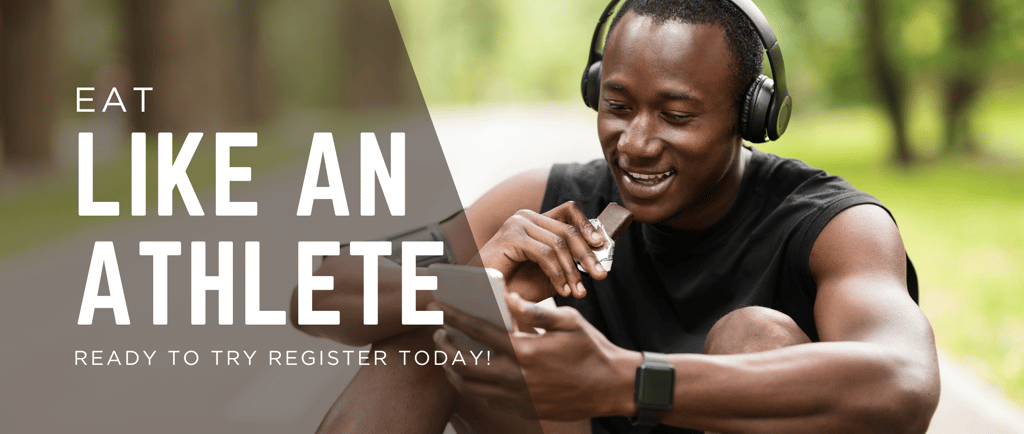Eating Like an Athlete: Fuel, Not Fads
Discover how to fuel your body like a true athlete, not with trendy diets, but with science, backed nutrition that supports performance, recovery, and real-life goals. Ditch the fads and learn how to eat smarter, train stronger, and StayMoving for life.
FUEL LIKE A CHAMPION
Iola Prieto
4/18/20253 min read


You're Not a Machine... But You Kinda Eat Like One
Eating like an athlete isn’t about kale smoothies in mason jars or protein powders blessed under a full moon. It’s about fueling your body for performance. Whether you’re a weekend warrior or training for your tenth triathlon, how you eat directly affects how you perform and recover.
Let’s bust some myths, break down some science, and build up your plate so it serves your sweat, speed, and stamina.
Energy Balance – It's Not Just About the Calories
Athletes aren’t just regular eaters. We’re energy-burning, muscle-torching, hydration-needing machines of glory. The energy balance equation is simple:
Energy In (food) = Energy Out (training + daily living)
But here's where it gets real: many active folks underfuel, especially those trying to “lean out.” But underfueling leads to fatigue, injury, burnout, and even hormone imbalances (amenorrhea in women is more common in underfueled athletes than you think).
🧠 Quick Science Bite:
Athletes should consume 45-60 kcal/kg/day, depending on intensity.
Endurance athletes might need up to 70-80 kcal/kg/day.
Now, that’s a whole lot of rice and pasta (and joy).
Macronutrients—Let’s Break ‘Em Down
Carbohydrates: Your Main Fuel Source
Carbs are not the enemy. In fact, for athletes, they’re your BFF. Carbs fuel muscles and brains, and without them, you’re just a beautiful zombie trying to do burpees.
Daily carb recommendations for athletes:
Light training: 3–5 g/kg body weight
Moderate: 5–7 g/kg
High: 7–10 g/kg
Pro Tip: A banana before a swim, a sweet potato after a long ride, or oats for breakfast are all excellent choices.
Protein: Recovery Royalty
Protein helps repair muscle tissue and supports immune function. You don’t need a tub of whey and a gallon of egg whites to get what you need.
Daily protein needs:
General athlete: 1.2–2.0 g/kg body weight
During heavy training: closer to 2.0 g/kg
Some of the best sources? Eggs, fish, chicken, tofu, Greek yogurt, lentils—and yes, protein shakes (the good ones).
Fats: Don’t Fear the Fat
Fats are vital for hormone production, long-distance energy, and joint support.
Guidelines:
About 20-35% of your total daily calories from fats.
Prioritize unsaturated fats: avocado, nuts, seeds, olive oil, fatty fish.
Timing is Everything – Yes, Even With Food
If you’re eating the right things but at the wrong time, you’re missing out on performance gains and recovery.
Pre-Workout Fuel
Aim for a meal 3-4 hours before training and a small snack 30-60 minutes prior. Focus on carbs with a bit of protein.
Example:
3 hrs before: rice, grilled chicken, steamed veg
30 mins before: banana or slice of toast with jam
During Exercise
For sessions >90 minutes: fuel every 45–60 minutes with quick-digesting carbs (sports drinks, gels, dried fruits).
Post-Workout Recovery
You’ve got about a 30–60 minute window to start refueling. Aim for a 3:1 carb-to-protein ratio.
Post-Workout Power Snack:
Chocolate milk (yep, it’s still a thing!)
Smoothie with banana, Greek yogurt, oats, and peanut butter
Rice with eggs and avocado
Hydrate or You’re a Human Raisin
Water is your best friend, but it’s not always enough. Athletes need electrolytes—especially sodium, potassium, magnesium, and calcium.
🔍 Hydration Tips:
Weigh yourself before and after a long session. For every pound lost, drink 20–24 oz of fluid.
If exercising >1 hour or in heat, use sports drinks or DIY electrolyte water.
DIY Electrolyte Mix:
500 ml water
1/4 tsp salt
1 tbsp lemon juice
1 tsp honey
Eating the Rainbow – Micronutrients Matter
While we focus a lot on macros, micronutrients are often forgotten—but vital.
Iron: For oxygen transport. Found in red meat, spinach, legumes.
Calcium + Vitamin D: For bone health.
Magnesium + Potassium: For muscle contraction and preventing cramps.
And yes, eat your greens. Your mom was right.
Sample Daily Meal Plan (for a 60kg endurance athlete)
Breakfast:
Oats cooked in milk with banana, chia seeds, and cinnamon
Hard-boiled egg on the side
Water or coffee
Snack (Pre-training):
Fruit + yogurt or a granola bar
Lunch:
Grilled salmon
Brown rice
Mixed greens with olive oil dressing
Fruit juice
Snack (Post-training):
Smoothie with whey, berries, oats, and nut butter
Dinner:
Quinoa stir fry with tofu and mixed veg
Avocado slices
Dark chocolate square for dessert
Hydration:
At least 2.5–3 liters fluid/day, more if training.
When It’s Okay to Laugh (and Eat Cake)
Life isn’t a diet. Even Olympians have cheat meals (or, as I call them, “balance days”).
The key is consistency, not perfection. Don’t fall into fad traps—juice cleanses, celery diets, or the “air-fryer-only” era. These might sell on TikTok but they’ll tank your training.
Balance your plate. Hydrate. Eat real food. And for the love of all that is sporty—don’t skip breakfast.
Final Thoughts: You Are What You Eat (But Don’t Eat Dumb)
Fueling like an athlete is about supporting your performance and honoring your body’s needs. It's not about cutting out whole food groups, but about adding the right fuel at the right time. If you're unsure, work with a sports nutritionist (ahem, hi!).
Remember—whether you’re trying to hit a PR, finish your first 5K, or just have enough energy to keep up with your kids—you’ve got to eat like you mean it.
And always: Stay Moving… or they’ll throw dirt on you.
Wellness
Empowering you through fitness and nutrition coaching.
Contact Me
Join The Staymoving community
Iolaprieto@staymovingtnt.com
+1-868-359-9361
© 2025. All rights reserved.


